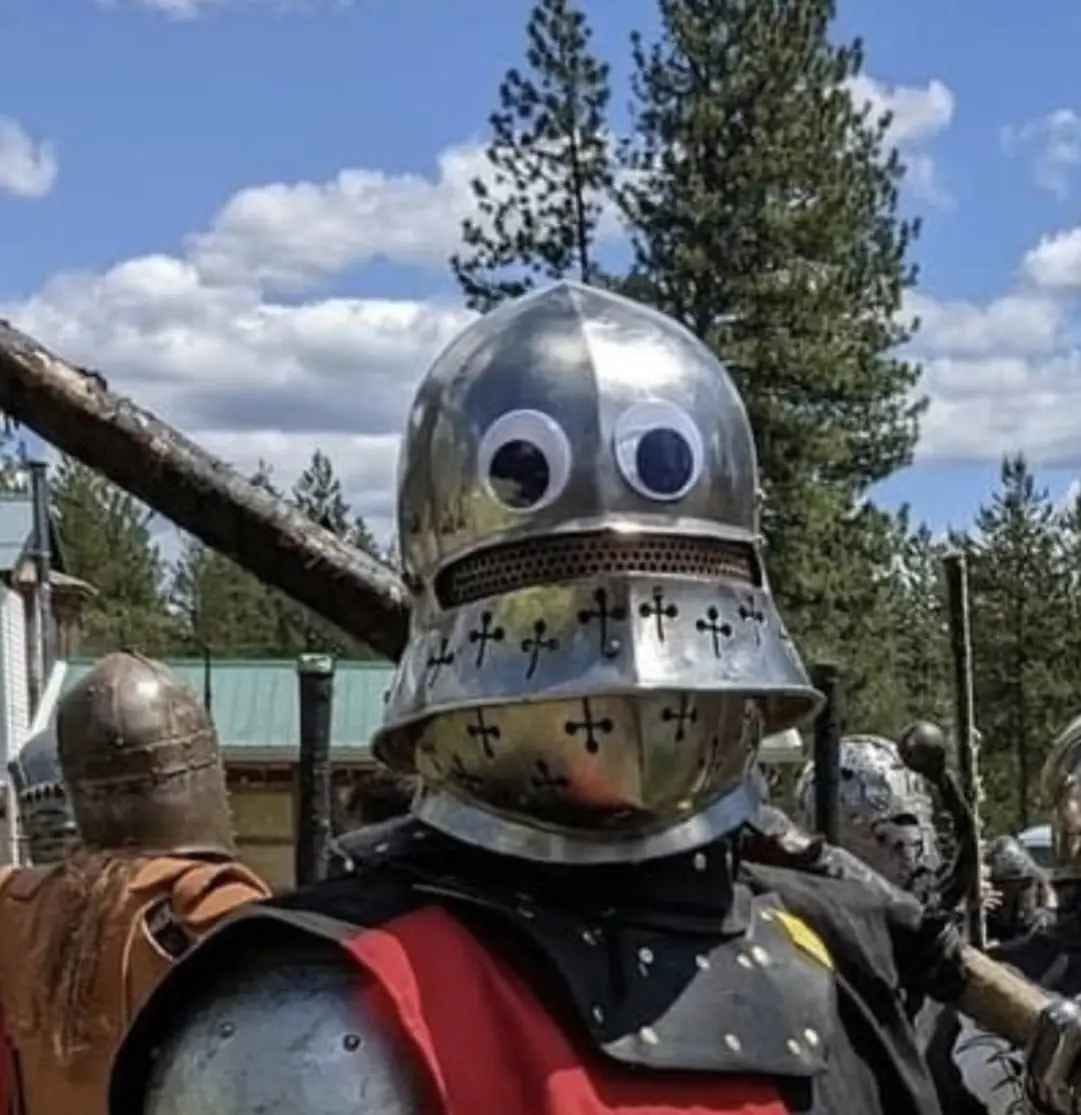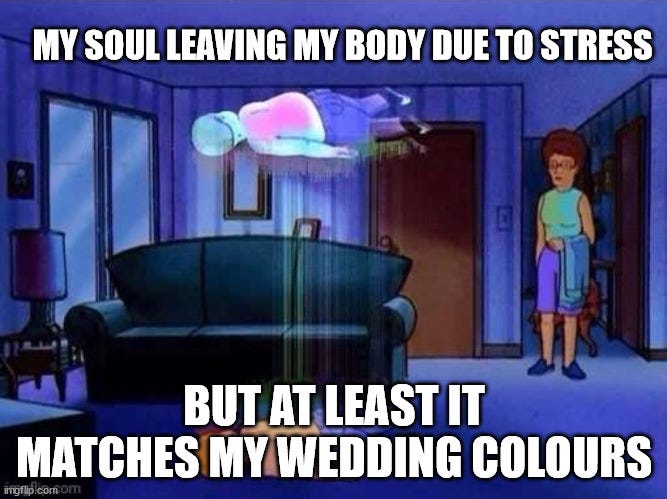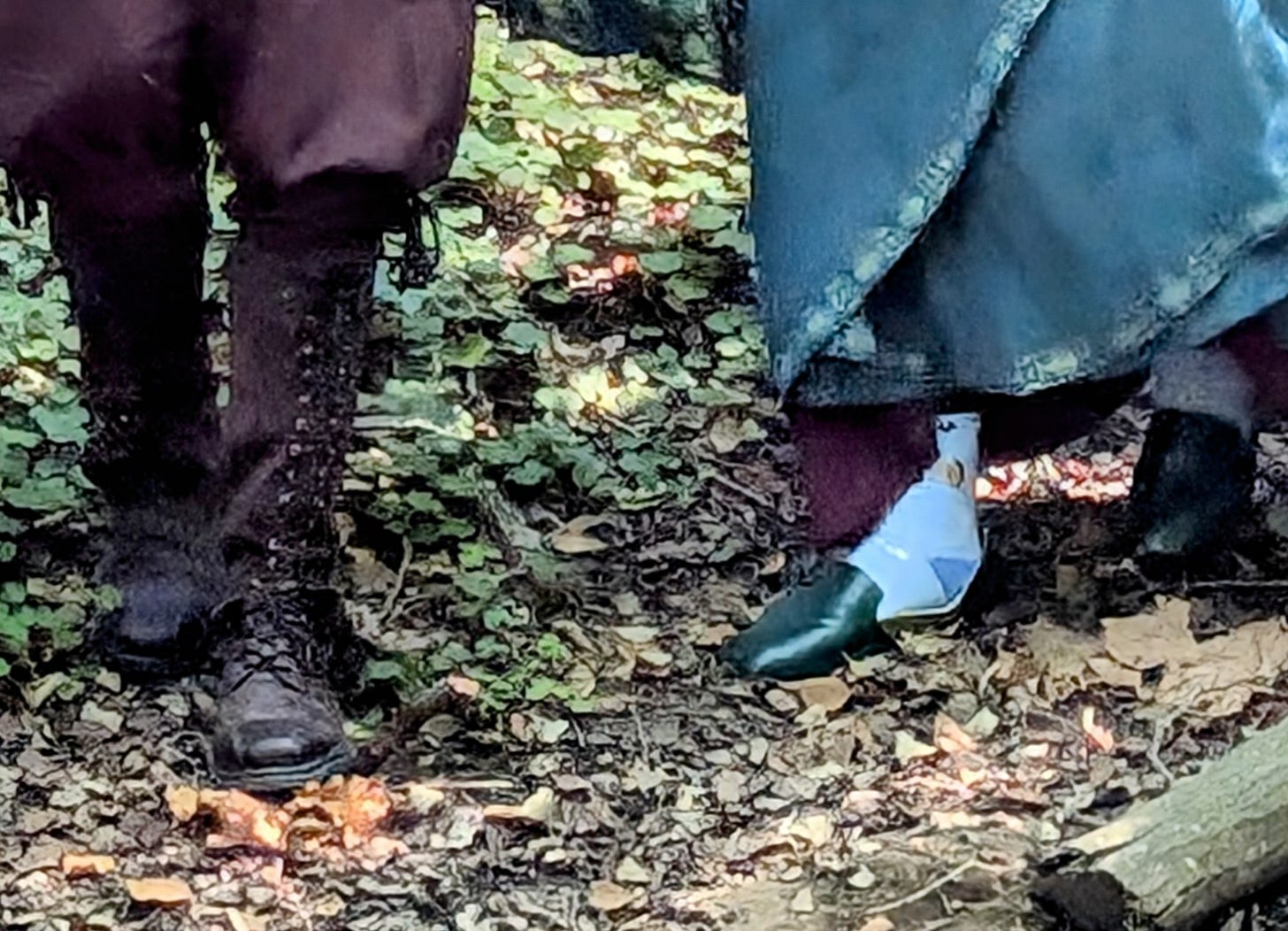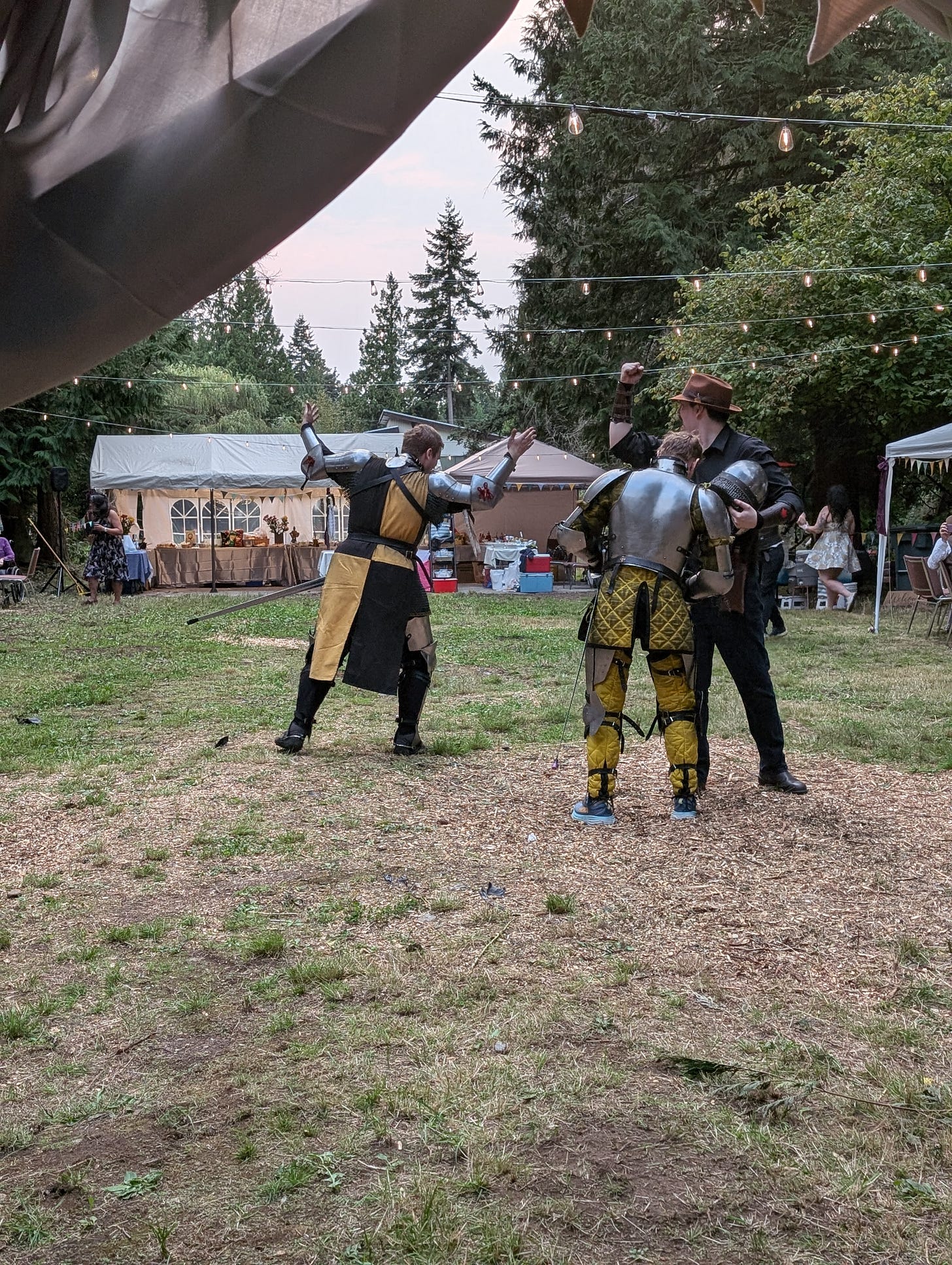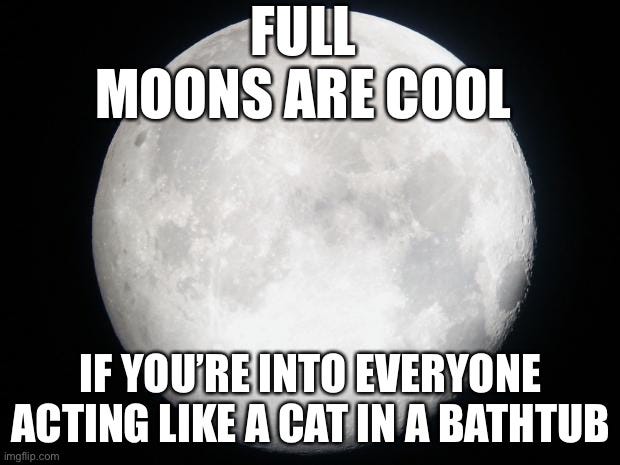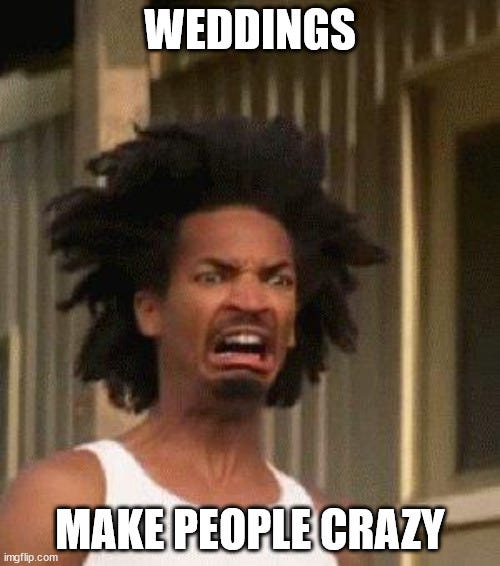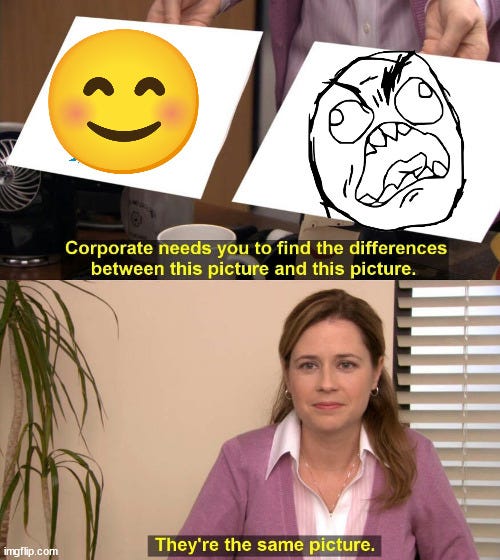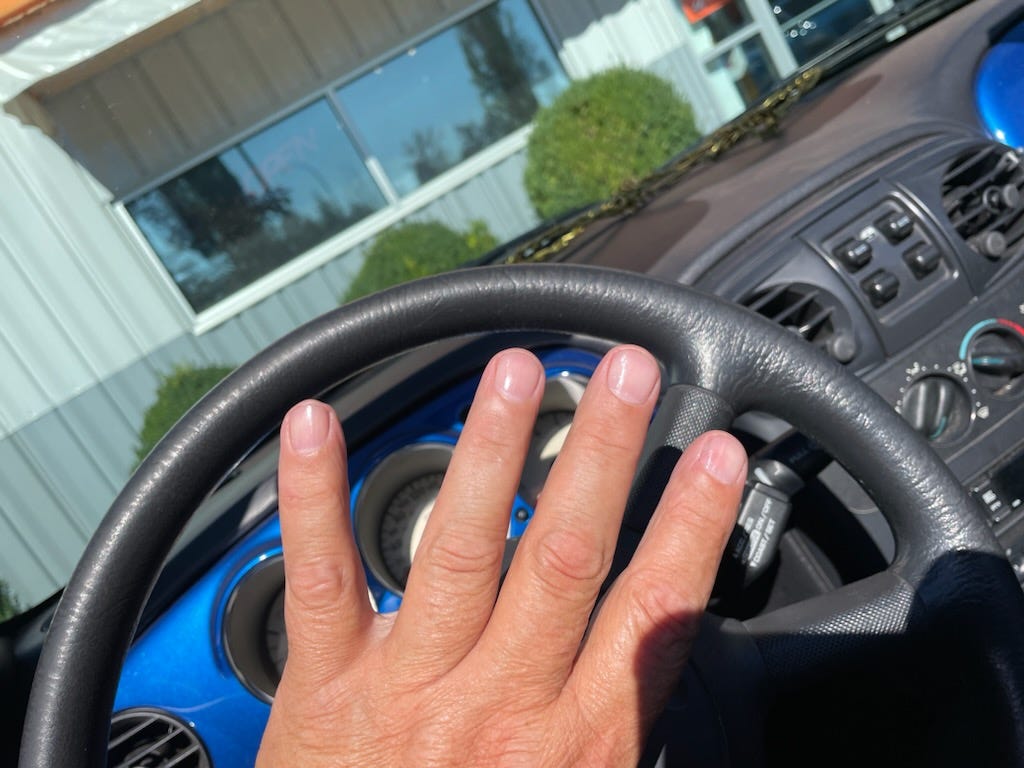I would like to start this post with a public service announcement for all of the self-styled ‘normal’ people who might be reading (although I’m fairly certain that none of them would read this blog).
Dear neurotypicals,
You can’t punish a neurodivergent person with passive aggression. It’s like mailing a letter to your cat to tell him you’re upset. If he cares enough to look for it, his lack of opposable thumbs will prevent him from accessing the mailbox. And even if you shove it under his nose, the strange runes on the page will confuse him. You’re really just making yourself angrier and not resolving anything.
Sincerely,
Your Neurodivergent friends
If it wasn’t obvious, I’m neurodivergent, which I promise will become relevant to the topic of mawwidge. Last weekend, I got married to Nicholas, in a beautiful backyard ren faire wedding.
Nicholas is the love of my life. Our hyperfoci and hangups complement each other. He has a deep well of patience and a great sense of humour. When we are upset with a situation, we scream into each others’ mouths. I don’t know how it started, but it’s cheaper than therapy when things go sideways.
Above: XKCD relationship advice
Being neurodivergent, I was gleefully unaware of all of the social and cultural hangups people have surrounding weddings.
I figured it basically boiled down to: bride spends a lot to look nice, friends take pictures, couple encourages guests to have fun and ta da, mawwidge.
At first, Nicholad and I were going to elope, but decided on a 100 person wedding because we didn’t want to hurt anyone’s feelings (which is apparently a statistical impossibility when it comes to weddings), and we wanted to put on an event for the community. All of our travel since 2020 has been celebration of life adjacent and we thought everyone would appreciate a lighter celebration.
That was the plan, anyway.
Honestly, I stimmed so much leading up to my wedding.
One night, during a particularly excited bout of echolalia, my daughter gently patted my arm and said,
“Momma, your stimming is a bit much. Can you please stim a bit more quietly?”
Fair enough, kiddo. You’ve heard me say that one enough. That’s the essence of parenting, really. Having a small person follow you around to make messes, give you hugs, and point out your own personal brand of hypocrisy by repeating everything you say. No parent is immune.
I was so excited that the neurospicy genetic blender was turned up to 10 and going brrrrrrrr.
But weddings are weird. And people get really weird about weddings.
Seemingly sane people start to ask you panicked questions about trivial things that don’t line up with your special interests. People care about minute differences between colours and whether or not their dresses are too similar or different from the brides, and what the heck is a tablescape anyway?
I decided we were going to have cloth tablecloths in silver, to be a little bit classy. Plus the goblin part of my brain really wanted to turn them into cloaks afterwards and start a secret society: the Order of the Silver Tablecover. Mostly, Nicholas and I wanted people to have fun.
It’s fair to say I was an unusual bride. I guess that threw people for a loop. Eyebrows raised when a minor alteration ended with my dress having no neckline a few days before the wedding. I shrugged it off. I had a last minute, emergency tailor, and an overshirt, a cool leather belt and leggings that (mostly) matched. Worst case scenario I had no dress. I was still marrying my best friend, so it was hard to care too much about what I was wearing.
I have been informed that you’re supposed to be more upset about things like that. But I trusted my tailor, Kimia, and she delivered the dress, just fine, an hour before the wedding ceremony. She was a true film costume professional.
I forgot to finish painting my shoes and ended up wearing the Super Mario Bros socks I found at Dollarama. I’m super amused that you can see Mario punching coins in any pics where I show an ankle. It’s like a little Easter Egg in our wedding photos. I am not difficult to please.
Knights from our HEMA school volunteered to come fight, and duelists battled with their rapiers. Our emcee had a plastic crown and a dragon puppet wrapped around his neck for most of the evening. In our ceremony, we exchanged swords and drank mead.
I totally agree with the friend who drunk texted me after they ended up wrestling in the dirt. Our wedding slapped.
For me, that was the focus.
Everything looked beautiful, but that was because I have talented and very helpful friends. I can art, but I have the spatial decorating awareness of a drunk raccoon. I have to exert deliberate mental effort to avoid leaving grubby crafting fingerprints on things.
The not-caring was mostly because I’m neurodiverse and an adult. I don’t feel much need to people please. I want to set an example for my daughter, and I’ve learned to cope with the realities of living with rapidly changing capacity.
My particular spice mix of neurodiversity includes both attentional challenges and monotropism. For the neurodivergent, executive capacity can be spiky, a hellavator of highs and lows from day to day.
The sensory reality during the leadup to the wedding was that my apartment was too hot, and my brain short circuited. So I tried to delegate all of the boring stuff that other people were getting incredibly worked up about to people who cared and who I trusted. I focused on knocking down the things that my brain was willing to play ball with.
Since we were doing things differently, I wanted to buck patriarchal traditions. The bog standard wedding ceremony was historically a formal property transfer - the bride being part of the property. We had an opportunity to model a partnership among equals for our daughter. We stripped away a lot of the traditions that were there to reinforce notions of women as property. Changing (some of) those things meant redesigning the wedding ceremony.
And when Nicholas and I sat down to plan our wedding, we decided together that we had two priorities:
1) minimal waste and spending
2) a safe, inclusive event for our community to enjoy themselves
In theory, that simplified everything.
On a planetary scale, traditional weddings are miniature portraits of opulence. They’re like tiny ecological disasters with tons of one time use items, overspending and waste. Neither of us wanted that on our conscience.
The average American wedding produces 400-600 lbs of trash, and around 60 metric tons of CO2 emissions, or around 4 times a typical individual’s annual output. That’s madness.
After we had established our parameters, I activated my research almonds and rabbit holed on the worst wedding offenders ecologically and ethically. I did a lot of research. And then I started to set boundaries.
I made it clear that I didn’t want dead plants as decor - the commercial flower industry is ecologically problematic, is expensive, has a lot of waste, and pesticide use runs rampant. It also seems a bit symbolically weird to me to celebrate a marriage by cutting short the lives of living things. We also didn’t want to buy or create extra plastic or little bits and bobs. We made signs out of wood. We ordered compostable plates and cutlery when we realized washing them ourselves wasn’t realistic.
We decided to have a potluck, for price, ecological, and safety reasons. My bridesmaid ran it fabulously, asking every guest for dietary restrictions and developing a food sensitivities checklist so that everyone could label their food. For a lot of us with food sensitivities, it’s hard to trust prepared food. A seasoning mix can contain unexpected soy or gluten, a veggie mix may contain mushrooms or zucchini, and if you have those allergies, it matters. A lot.
As for our ceremony…
We handfasted. I didn’t wear white. I wanted to re-wear my dress and encouraged people to choose something comfortable from home to wear instead of supporting fast fashion. I didn’t want to walk up the aisle on one man’s arm to be handed over to another… but I conceded that point to not hurt my dad’s feelings.
I didn’t feel comfortable modelling a man’s right to publicly remove pieces of women’s clothing (garter) or creating moments of shame for those who may be ace or alone (the bouquet toss). Neither of those felt like particularly healthy social practices. And there were cupcakes, but no wedding cake. For the curious mind looking to traumatize itself, there is ample information on the history of wedding cake traditions online.
Our ceremony was equal parts irreverence, solemnity and romance. So many friends offered to step in to help and entertain. There were knights fighting and duelists and dinner included a viking charcuterie ship. It was wonderful. We’ve had so many people tell us it was the most fun they’ve ever had at a wedding. We’ve gotten thank you’s from people who felt safe and included. We’re happy we made the choices that we did.
It was also not ecologically “perfect”, by any stretch.
But it was eye-opening.
I have come to realize that weddings do something strange to people, like full moons or Mercury in Gatorade.
Social expectations and the infrastructure that underlies our supply and transportation networks make it exceedingly challenging to have a carbon zero wedding.
From buying biodegradable objects shipped in plastic to driving around to pick up used items, it’s hard to measure the environmental impact we had by trying to have an eco-friendly wedding.
I am immensely happy to have married Nicholas. But honestly, he’s pretty awesome, and I would have married him in my pyjamas in our living room.
I also didn’t know that weddings always come with conflict. And I’m not talking about the dudes half-swording it in 14th Century armour.
I am still baffled by how people who aren’t the bride and groom are personally affronted by the idea of respecting the couple’s wishes. And yeah, we had people who invited other people, got offended by unexpected things, and tried to be helpful by ‘correcting’ us.
Apparently this is ‘normal’ with weddings. I think it’s disappointing that unhealthy behaviour is the gold standard. It’s downright bizarre to not respect two adults wishes and autonomy on a day that’s designed to celebrate them. But I guess I have neurodivergent social skills, not neurotypical social skills. Thank God.
In the aftermath, when we were trying to dissect what had turned mild mannered Jekkyls into chaotic and destructive Hydes, Nicholas brought up Marvel. You notice how in most Marvel movies, the ones preserving the status quo are the heroes and the ones changing the status quo are the villains?
That tracks. And it made me think of Disco Elysium.
Personally, I don’t think there has to be a binary division between the status quo and chaos. There’s a hidden third option that I like to call, ‘don’t be a dick’. But a lot of people, who benefit from or rely on the status quo for comfort and stability, feel threatened and uncomfortable when things differ from their expectations.
In the weeks leading up to my non-traditional wedding, I was shouted at, sworn at, gaslit and given the cold shoulder... most of which I didn’t notice until other people started getting uncomfortable and pointing it out. (See earlier statements about expecting cats to read). I was shouted at for asking for things that I didn’t - things that went against Nicholas and my shared values. It was nonsensical. And I now understand, that is a normal part of being a bride.
It is part of the social contract of bridehood to have at least one person deride you and treat you like a Bridezilla. Oh hi patriarchy, we see you. Are those your convenient traditions of minimizing or discounting women as awful or crazy when they set boundaries or are feeling special? Thought so.
I didn’t expect it. It’s been emotional whiplash between extreme joy of marrying the man of my dreams and being the target of blame for things that were entirely constructed in others imaginations.
Welcome to bridehood. It’s a sorority of kindred souls, drawn together by common trauma and tablescapes.
Every wife I’ve spoken to has a story of friends or family members who chose to wreak havoc and ruin their own reputations during someone else’s wedding.
One woman told me about a mother who “surprised” a bewildered bride and groom with a queen Elizabeth impersonator taking over their reception schedule to do a complete half hour set… honestly, as a performer, I felt bad for the impersonator once she realized what was going on.
Another recounted a mother who loudly berated her son about his messy house while he was at the head table… and everyone could hear.
Can’t forget the old friend who got drunk and decided to pick a fist-fight with a groomsman on the dance floor.
And the piece de resistance alcoholic father whose cheque for the venue bounced, so he skipped town and left the newliweds with the bill.
A wedding lets you get to see who’s really hiding behind the mask. It’s been an important learning experience. Many of our closest confidants have shown inner reserves of treasure, but there’s always one dumpster fire waiting for someone to bumble over, crack the lid and give it air.
And I suspect that a big part of this is inherent discomfort with changing the status quo. You see people’s worst sides under stress. They want to save face. And sometimes this becomes a pathological need. That’s when people become oblivious to the chaos they’re causing.
At a more reasonable level, people want to play the roles they told themselves they get to play in the ritual pagaentry. It’s why in the end, I decided to let my dad walk me down the aisle, despite hating this tradition. (I swear it’s not you dad, the tradition goes back to a father walking a daughter down the aisle so she couldn’t run away from an arranged marriage).
A lot of people find transitions stressful. And transitions don’t scale much bigger than a wedding. It is the formalization of couplehood, of families. For a lot of parents it marks an uncomfortable mental shift to viewing their children as adults with their own spouses or families.
To some degree, with these big life changes, people feel comfort in relying on known traditions.
To some degree, there is a right, good way to do things, and a wrong, bad way to do things. And in a way that’s where all stories begin, don’t they?
That is the essence of most conflict.
It’s why people can see themselves as protagonists and paint others as villains, when their own behaviour ticks an awful lot of DSM diagnostic boxes.
The wedding villain is supposed to be an overbearing bride. She is supposed to wear white. Sometimes there’s an evil mother-in-law (mine was great, honestly). But that’s what’s in the script.
I noticed that people conform to cultural expectations in small ways too. So many women got excited about the new clothes they’d bought just for the wedding. And I realized that a wedding was a cultural behemoth beyond the control of the bride and groom. It was its own entity, one of the last big preserved rituals, and the people in the village were determined to play the appropriate parts. How utterly fascinating.
A wedding functions as an excuse to treat yourself and to buy new things. My dad, a mechanic, who has long been a perpetrator of axle grease handprints on the walls of our rental homes, got a manicure. My entire life, I’ve never seen his hands so clean.
Perhaps, these village festivals, these big events, these rituals, haven’t become less important to people, just because we have fewer of them. Perhaps instead, there is greater social pressure to get the few community rituals that remain, ‘just right’.
And I guess I’ve also learned that standing up for your values is hard.
Doing what you feel is right makes people uncomfortable. It creates conflict and starts arguments you don’t want to be a part of.
When you set boundaries, some people will be unexpectedly respectful, and other people will repeatedly try to crash against them and blame you when they hurt themselves doing it. It’s easier to point your finger than to do self-reflection.
And you can’t win ‘em all.
Oh well.
Our wedding absolutely slapped. And in the end, that’s what matters.





